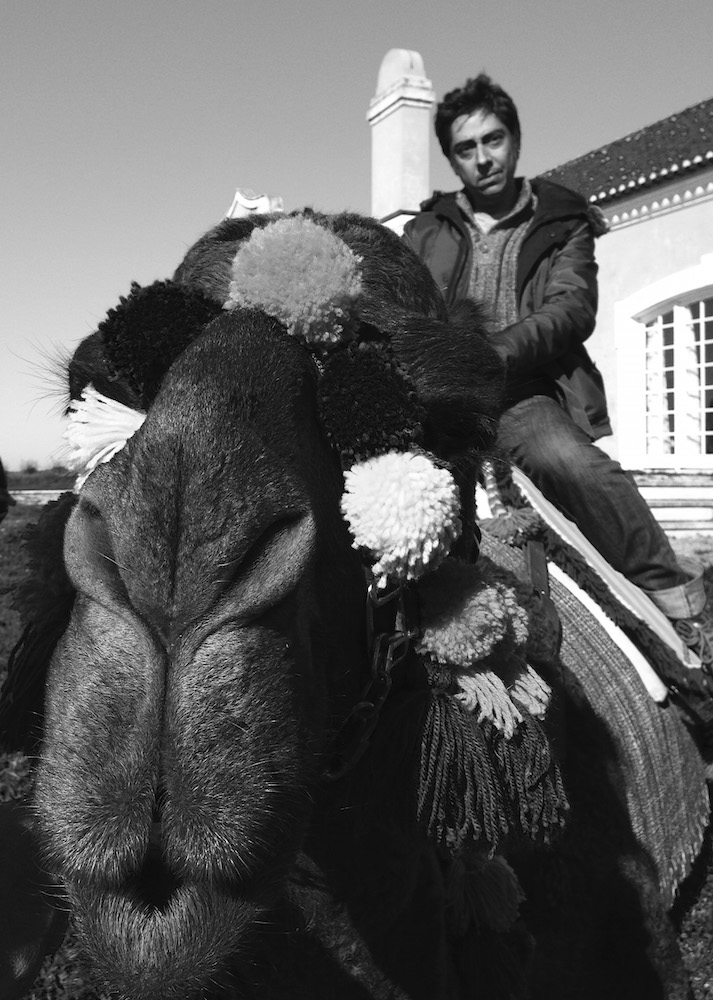The Epic Miguel Gomes
On the subject of political film, Portuguese director Miguel Gomes and his oeuvre have made a hard case in redefining how and what we think about the genre. His divinely staged Tabu (2012) dressed the fetid intersection of colonialism in Africa and modern Europe in 16 and 35mm black-and-white, positioning a lurking crocodile as a Murnau-styled villain and potent allegory. His latest effort, Arabian Nights, which takes on quotidian life in austerity measure-strapped Portugal through the structure of Scherezade’s epic tales, is a six-hour trilogy of a seamless mish-mash of tone, genre, and feeling, spinning true stories sourced by Portuguese journalists into fodder for fantasy and surrealistic tableaux.
The three episodes, titled The Restless One, The Desolate One, and The Enchanted One, will begin screening today in New York. Interview spoke with Gomes at the New York Film Festival this past October.
COLLEEN KELSEY: This is a wild, chaotic film based on chaotic events. When did you realize that chaos was going to be the right storytelling context for this film?
MIGUEL GOMES: I was always interested in having a film with tales, this kind of structure. We were even, me and the world: I had to follow chaos [and] try to react to chaos with my own kind of chaos. I’ve been fascinated by Arabian Nights, the book, since I was 12. I never got to finish it, to be honest, but it’s something that I regularly read. I was fascinated with this power that the book has, this endless potential of fiction. It’s vertiginous; you have stories within stories within stories. It’s like a labyrinth of seduction. One the other hand, it’s quite wild, as you said, sometimes quite obscene, like rock ‘n’ roll before rock ‘n’ roll was invented. I see a parallel with this chaos and the extreme stories that were also happening in Portuguese society. I thought it was good to have insurance to help me with this one.
KELSEY: At the beginning of Episode One, there is, I don’t know if we can call it a “director’s statement,” but you address the audience that there is an “impossible film” beginning. Why was it important to you to set the stage for the film that way?
GOMES: It’s almost like a manual of instructions. I think that there’s a very lucid side in cinema: entering a theater and seeing the film. The film is talking with us, and we can give the film something too, because we can only respond with our inner world, with our sense of humor, with our interests. Now they say films they are made by computers, you know this? There are computer programs to see statistically what people are more interested in, and they practice computer combinations in these things to try to have more viewers. I think this is talking to no one. It’s like a robot, and I don’t believe that people are robots. I think you should try to get personal, try to put yourself in the film in a deep way, and try to give that to the viewer, even if some of them will not connect with that kind of universe and surreality.
KELSEY: How did you go about collecting those stories and refining the scope of what ended up in the film?
GOMES: We had many, many more stories to shoot, but we could not. I could do this for 20 years. We decided this idea to be attached to the facts that were happening in my country, which is a small one, but nevertheless, it’s a country. So there’s lots of things happening every day. Then we came up with this idea of having a crew of journalists. These journalists, in the morning, would repeat everything that was happening, local newspapers, the well-known ones, the internet, but they were also doing their job. In the afternoon they would provide us with more material to create stories for Scheherazade.
KELSEY: With that infinite wealth of material, how did you decide on settling on three episodes rather then going on to more or less?
GOMES: It was an accident. Now, I think it’s my response to George Lucas and Peter Jackson. It’s my response to the blockbuster trilogy possible in Portugal. We had one year with these journalists to research and to shoot the most possible stories. We were not thinking of how we could organize the film, what would be the length; it was not our priority. So during the editing, we came to the conclusion that we had three feature films. Each one of them would have their own identity. There will be different cinematographical experiences.
KELSEY: These events were taken from a specific timespan. In encapsulating a recent history, did you think much about the film as a particular time capsule or a summary of a particular moment that’s still evolving for many people?
GOMES: I’m fond of that concept of that capsule of time. Sometimes I think of it like Noah’s Ark because we have lots of animals in the film: Talking crocodiles and Walt Disney dogs, camels. But [it’s] a capsule of time of stories related to a certain moment in Portugal and Portuguese society. I’m quite curious to see what time will do to this film. Imagine in 20 years, we can look at this film and we can see the film was quite optimistic, or the world will be in bad shape. Since I finished the film we had lots of things happen. Now, we have this chaos in Europe because all the countries don’t agree on this question of refugees, and so you can see all the mechanisms that were built that appear to be for me, and for lots of people, the basis of this union, and they are not so solid.
Europeans used to be proud to be the advanced form of democracy. Now they’re definitely a little bit ashamed because we are seeing that finally, the bond that we had, it was money. We created the coin, a currency, and when money was flowing, everything went fine. Now it’s not going so well and Europe is breaking apart. I don’t know what will happen, but episodes like what we have seen in the last weeks with the question of refugees, and the humiliation to the Greeks, I feel profoundly ashamed of what is happening.
KELSEY: Jumping off that absurd sequence in The Restless One of the financial powers meeting around a table, I wanted to talk about satire and humor, bringing levity to tragedy.
GOMES: We tried to have very different tones in this film. One of them is satire, and that moment, this title, The Hard-On Men, works with the codes of farce and satire. Even then I think that cinema, it’s not like a court. So we cannot judge people. Of course, I’m not very close to bankers or to these guys of the Portuguese government, even then I think that, first there’s this character of the Prime Minister. Even if his behavior is quite stupid in the film, it’s kind of touching, even, because he’s so childish. He keeps drawing the unicorns in the restaurant and his engraving his name like a kid. It’s a tragedy in the film that there is a country ruled by such a childish character, but even then, it’s not like he was the devil.
I think that I prefer to shoot characters even if they are not good people. I don’t think that cinema is a place where you can do sentences like in a court. So, I think that even if this part of the film is a little bit heavy on the language, very explicit, it’s Arabian Nights. I think my film is quite puny compared to the book. But even then I think there’s a kind of melancholical feeling. It has something a little sad attached. I think that this sadness redeems the more brutal stuff that exists in the course of the farce. And of course for me, the reality of this episode comes not from the fact that I think that the government guys and the ministers and the troika elements, the accountant, are real wizard, but the sensation that we Portuguese shared something in common, even if it was by the silliest reason. Like, they were happy because they found a wizard that gave them an aphrodisiac potion, and so they are happy, and then don’t care about imposing these austerity measures to Portugal.
KELSEY: Scheherazade is recounting these stories for her own survival, and I think it’s quite poignant that perhaps viewers who have this reality can see these stories and preserve themselves through a tale rather than the bleak reality of them.
GOMES: Precisely, this is why we tell stories. We tell stories, not to escape from reality, but to show reality in a constructed fictional way. It’s also a way to tell truths about our lives, not just to show things how they are, we have also space for that in the film, but to transmit something. It’s a very powerful way to transmit something. Our memories are built on real things we have lived ourselves, but also in things we lived through fiction by reading books or by watching films. All these things, they are important to us. When they talk to us, we stick with them. I think it’s important to continue to do this.
ARABIAN NIGHTS: VOLUME 1, THE RESTLESS ONE OPENS TODAY, DECEMBER 4. VOLUME 2, THE DESOLATE ONE AND VOLUME 3, THE ENCHANTED ONE, OPEN DECEMBER 11 AND 18, RESPECTIVELY.







